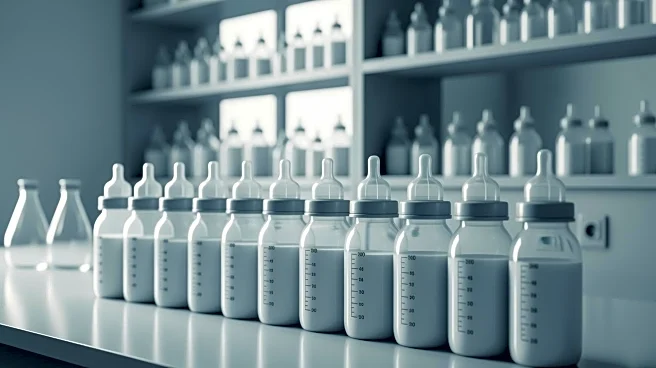What's Happening?
Abbott Laboratories has secured a legal victory in a case concerning its Similac Special Care 24 (SSC-24) infant formula, which was alleged to have caused necrotizing enterocolitis (NEC) in a baby. The
U.S. District Court for the Northern District of Illinois ruled in favor of Abbott, dismissing the plaintiffs' claims that the formula's design was unreasonably dangerous. The case, part of a series of bellwether trials, was initially filed in Louisiana before being transferred to Illinois. The plaintiffs argued that a human milk-based formula would have been a safer alternative to the cow's milk-based SSC-24. However, the court found Abbott's evidence regarding the utility of SSC-24 and the impracticality of the plaintiffs' proposed alternative to be substantial and uncontested.
Why It's Important?
This ruling is significant as it addresses ongoing concerns and litigation surrounding the safety of specialized infant formulas, particularly those used for premature infants. The decision may influence future cases involving similar claims against formula manufacturers, potentially affecting the infant nutrition industry. Abbott's victory underscores the challenges plaintiffs face in proving product liability in cases involving complex medical and nutritional products. The outcome may also impact regulatory scrutiny and the development of alternative infant nutrition solutions, as companies may be encouraged to invest in research and development to address safety concerns.
What's Next?
The court's decision may lead to further legal actions as other similar cases are pending. Abbott and other formula manufacturers might face continued scrutiny and potential litigation, prompting them to enhance product safety measures and transparency. Regulatory bodies could also respond by reviewing guidelines and standards for infant formula safety. Additionally, the ruling may influence public perception and consumer trust in infant nutrition products, potentially affecting market dynamics and prompting companies to innovate safer alternatives.
Beyond the Headlines
The case highlights broader ethical and legal considerations in the infant nutrition industry, particularly regarding the balance between product innovation and safety. It raises questions about the responsibility of manufacturers to ensure the safety of vulnerable populations, such as premature infants. The legal precedent set by this case could influence future product liability cases, shaping the landscape of consumer protection and corporate accountability in the healthcare sector.









